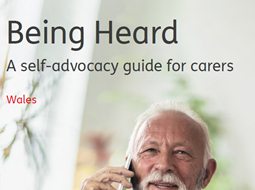Speaking to your employer
As a working carer, you may fear that revealing your challenges outside of work may negatively impact how you are perceived or your work prospects. In creating this guide, carers have spoken about concerns they will not be given opportunities on certain projects if they are considered unreliable due to their home lives. Others were concerned they may miss out on promotion opportunities or simply be treated differently which could alienate them from colleagues.
However, talking about your caring role can be an important step to getting the support you need in the workplace. It can be very helpful to talk about your concerns. Being listened to can help you process the situation and help you feel less alone.
Although it can be difficult to talk about your caring at work, it can be positive to talk to your employer about your caring role. Many carers we spoke with discovered that their employer was willing to work with them to make meaningful changes and, in some cases, even increased the confidence their employer had in them. More employers are learning the benefits of the skills carers develop in their caring role and the benefit this has to them as employers.
Frequently asked questions about speaking about caring in the workplace
If you are struggling and are concerned that you are unable to continue working and caring, you should speak to your employer immediately.
If you are currently comfortable with your work and care balance, making your employer aware of your caring role gives you both time to develop a plan for when you may need help. It also gives you the opportunity to trial different approaches with them that can further improve your work/care balance.
This will depend on your organisation and your relationship with your line manager. If you have a good relationship with your line manager, this is the first person to speak with. They may be able to start planning additional support with you or can support you to approach the right people within your organisation.
You can also approach your HR department. They have a legal responsibility to support your wellbeing and must make note of your situation and start a process of providing legal and contractual support. You can also speak to your carers network or wellbeing champions if you have them in your
organisation.
Before the meeting, you should write notes on the subjects you want to discuss. Writing down key points can help you feel better prepared and ensure you do not miss anything out.
If you are asking for direct changes from your employer, you should write these down as well. You may also want to bring this guide with you to help discuss what you are looking for.
Your employer has some legal duties that they must respond to and, in some cases, give justification for their decision. However, it is also important to remember that communication goes two ways. Be open to suggestions from your employer. They may have ideas you have not previously thought of or specific schemes to give you even more support. You may need to negotiate elements of what you want compared to your employer’s need.
Whether you choose to tell your colleagues is up to you. You are under no obligation to talk to your colleagues about your caring. However, sharing information about your caring role may lead to a more supportive atmosphere and understanding. This can be particularly useful if and when additional support is put in place by your employer that your colleagues may notice. You may also help someone else who is juggling work and care to identify as a carer and seek support.


